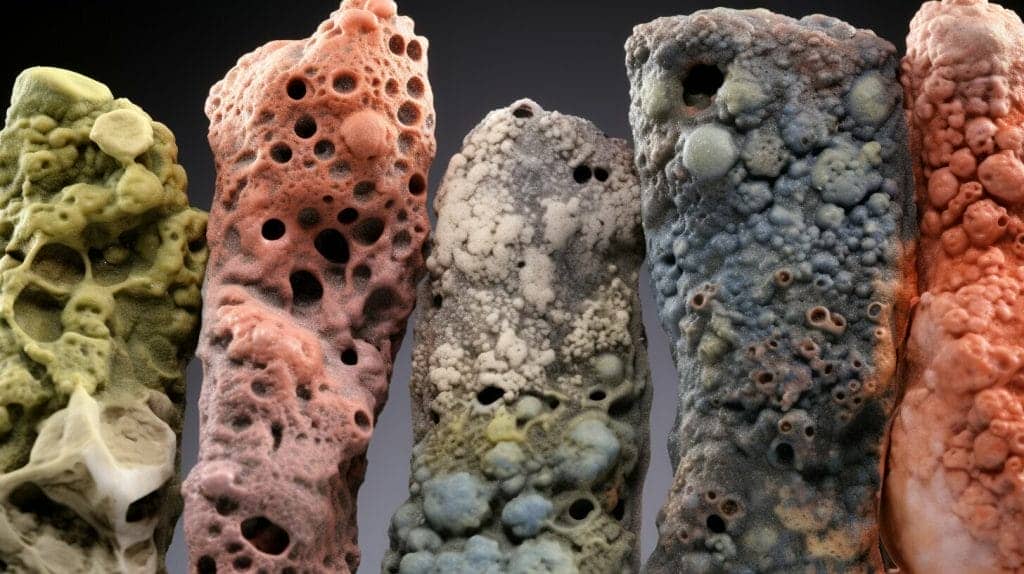Exposure to mold is a common problem that can result in a range of health issues. Mold spores in the air can trigger an immune response and cause inflammation in the body. This reaction can be particularly dangerous for individuals with autoimmune disorders, as it can exacerbate their symptoms or even lead to the onset of new conditions. Understanding the risks and taking steps to prevent mold exposure is crucial for maintaining a healthy living environment.
Key Takeaways:
- Mold exposure can contribute to the development or worsening of autoimmune disorders.
- Mold toxins can disrupt immune function and increase the risk of autoimmune conditions.
- Preventing mold exposure and improving indoor air quality can help reduce the risk of autoimmune disorders associated with mold exposure.
Understanding Mold Exposure and Autoimmune Disorders
Autoimmune disorders are conditions where the body’s immune system attacks its own healthy cells and tissues, causing inflammation and damage. While the exact causes of autoimmune disorders are not fully understood, it is believed that environmental factors, such as mold exposure, can play a role in their development.
Studies have shown a connection between mold exposure and autoimmune disorders, with mold toxins triggering immune system dysfunction and inflammation. Mold exposure can exacerbate symptoms in individuals with pre-existing autoimmune disorders, as well as increase the risk of developing new conditions.
Autoimmune disorders associated with mold exposure include rheumatoid arthritis, lupus, multiple sclerosis, and Sjögren’s syndrome. Mold exposure can also contribute to the development of respiratory conditions like asthma and allergies, which have been linked to autoimmune disorders.
Mold exposure can affect the immune system in several ways. Mold toxins can disrupt the production of certain immune cells, impair immune system surveillance and regulation, and trigger inflammation. This immune dysfunction can lead to the development of autoimmune disorders.
Recognizing the symptoms of mold exposure is crucial in identifying potential health issues. Symptoms of mold exposure can range from mild to severe and include respiratory problems, skin irritation, headaches, and fatigue. Individuals with pre-existing autoimmune disorders or compromised immune systems may be more susceptible to the effects of mold exposure.
In the next sections, we will discuss common autoimmune disorders associated with mold exposure, the effects of mold exposure on the immune system, and strategies for preventing mold exposure and reducing the risk of autoimmune disorders.
Common Autoimmune Disorders Associated with Mold Exposure
Mold exposure has been linked to a number of autoimmune disorders, including:
- Rheumatoid arthritis
- Lupus
- Scleroderma
- Sjogren’s syndrome
- Multiple sclerosis
- Celiac disease
- Hashimoto’s thyroiditis
Mold-related illnesses and autoimmune conditions are believed to occur when the immune system is triggered by exposure to mold toxins. The inflammation and damage caused by the immune system’s response can lead to the development or worsening of autoimmune disorders. Individuals who have existing autoimmune conditions may also experience exacerbation of their symptoms when exposed to mold.
According to studies, individuals living in damp and moldy environments are at an increased risk of developing autoimmune diseases. In fact, a 2016 study found that individuals who were exposed to water damage and mold at home were two to three times more likely to develop an autoimmune disorder than those who were not exposed.
The Effects of Mold Exposure on the Immune System
Mold exposure can have harmful effects on the immune system, which in turn can increase the risk of autoimmune diseases. Mold toxins, also known as mycotoxins, can interfere with the normal functioning of immune cells, such as T-cells and macrophages, which play a crucial role in fighting infections and diseases.
When the immune system is compromised, it becomes less effective in identifying and destroying foreign substances, including pathogens and toxins. This dysfunction can result in chronic inflammation and damage to healthy cells and tissues, which can lead to the development of autoimmune disorders.
In addition, mold toxins can directly damage the DNA of immune cells, which can impair their ability to function properly. Over time, this can lead to the development of mutations that may eventually lead to the development of cancerous cells.
The Mechanisms Behind Mold Exposure and Autoimmune Disorders
The exact mechanisms by which mold exposure can trigger or exacerbate autoimmune disorders are not yet fully understood. However, researchers have identified several possible pathways, including:
- Activation of the immune system: Mold toxins can stimulate the immune system, which can lead to an overreaction and subsequent damage to healthy cells and tissues. This can trigger or worsen autoimmune disorders.
- Increased permeability of the gut: Mold toxins can damage the gut lining, which can lead to an increased permeability of the gut. This allows for the leakage of toxins and bacteria into the bloodstream, which can trigger an immune response and contribute to autoimmune disorders.
- Alteration of gut microbiota: Mold toxins can disrupt the balance of gut bacteria, which can impair immune function and trigger inflammation. This can contribute to the development of autoimmune disorders.
Overall, mold exposure can have significant effects on the immune system and increase the risk of autoimmune disorders. It is important to take proactive steps to prevent mold growth and minimize exposure to protect your health.
Recognizing Mold Exposure Symptoms
Mold exposure can lead to a range of health problems, including autoimmune disorders. It’s important to recognize the symptoms of mold-related health issues in order to take action before they worsen. Mold-related health problems are often associated with inflammation, which is a hallmark of autoimmune disorders.
Common symptoms of mold exposure include:
- Respiratory problems, such as coughing, wheezing, and shortness of breath
- Nasal and sinus congestion or irritation
- Eye irritation or vision changes
- Headache
- Memory problems or brain fog
- Fatigue
- Skin irritation or rashes
- Muscle weakness or pain
- Joint pain and stiffness
If you’re experiencing any of these symptoms, especially in combination with each other, it’s important to consider the possibility of mold exposure. This is particularly true if exposure to mold has occurred in the past or in your current living environment.
It’s important to note that not everyone who is exposed to mold will experience symptoms. However, those with weakened immune systems, allergies, or existing autoimmune disorders may be at a higher risk for developing health problems related to mold exposure.
Diagnosing Mold Toxicity and Autoimmune Disorders
Diagnosing mold toxicity and autoimmune disorders can be challenging as the symptoms may mimic those of other conditions. A comprehensive evaluation from a qualified healthcare professional is essential for an accurate diagnosis.
Medical tests that can help identify mold toxicity include blood and urine tests, as well as imaging studies such as X-rays and CT scans. These tests can detect the presence of mold toxins in the body and help evaluate the level of immune system dysfunction.
For autoimmune disorders, medical evaluation and testing may include blood tests to check for specific antibodies and inflammation markers. Imaging studies like MRI can also be helpful in identifying areas of the body affected by autoimmune conditions. A thorough medical history and physical examination are also necessary to obtain an accurate diagnosis.
At Oasis Medical Institute in Tijuana, MX, Dr. Francisco Contreras MD offers a comprehensive mold toxicity evaluation and treatment program. This program includes specialized laboratory testing and immune system assessments to identify the root cause of mold-related health problems. With a focus on integrative medicine, the program seeks to restore a patient’s overall health and wellness, offering customized treatment plans to meet individual needs.
If you suspect mold toxicity or autoimmune disorder, it is essential to seek medical evaluation and treatment promptly. Call 866-868-1992 today to book a consultation with Dr. Francisco Contreras MD to learn more about Oasis Medical Institute’s holistic Mold Toxicity treatment program.
Holistic Treatment Approaches for Mold Toxicity
When it comes to treating mold toxicity and associated autoimmune disorders, a holistic approach can be beneficial. Oasis Medical Institute in Tijuana, MX offers a comprehensive program for patients seeking holistic treatment for mold toxicity.
Under the guidance of Dr. Francisco Contreras MD, a renowned expert in integrative medicine, the program focuses on a combination of therapies that address the underlying causes of mold toxicity and autoimmune disorders. This holistic approach supports the body’s natural healing processes and promotes overall wellness.
The program includes a thorough evaluation to assess the patient’s condition and determine the appropriate course of treatment. The treatment plan may include a combination of therapies such as detoxification, nutritional therapy, immune system support, and other integrative modalities.
Detoxification is a crucial component of the program as it helps remove toxins from the body and minimize the impact of mold exposure on the immune system. Nutritional therapy is also emphasized to support the body’s immune function and promote optimal health.
In addition, the program offers various supportive therapies such as stress management, exercise, and lifestyle changes, which can help manage the symptoms and improve the quality of life for patients with mold toxicity and autoimmune disorders.
Overall, the holistic treatment program at Oasis Medical Institute provides a comprehensive, patient-centered approach to treating mold toxicity and associated autoimmune conditions. By addressing the underlying causes of these conditions and supporting the body’s natural healing processes, patients can achieve optimal health and wellness.
Prevention Tips for Mold Exposure and Autoimmune Disorders
Mold exposure can pose significant risks to individuals with autoimmune disorders. To reduce the risk of mold-related health problems, it is essential to take proactive measures. The following tips can help prevent mold exposure and immune system dysfunction:
- Avoid moisture buildup: Mold thrives in damp and humid environments. Use dehumidifiers and exhaust fans to control moisture levels and reduce the risk of mold growth.
- Fix water leaks promptly: Leaky pipes, roofs, and windows can create conditions favorable to mold growth. Address leaks as soon as possible to prevent water damage and mold growth.
- Clean and dry surfaces: Regularly clean and dry surfaces that are prone to moisture buildup, such as bathrooms, kitchens, and basements.
- Use mold-resistant materials: Building materials that are resistant to mold growth, such as drywall and paint, can help prevent mold exposure.
- Watch for signs of mold: Keep an eye out for signs of mold growth, such as musty odors and discoloration on walls or ceilings. If you suspect mold growth, have an inspection performed as soon as possible.
- Wear protective gear: If you need to clean up mold, wear protective gear such as gloves, goggles, and a mask to avoid exposure.
- Keep indoor air quality high: Good indoor air quality can reduce the risk of mold growth and immune system dysfunction. Use air purifiers and ventilation systems to improve air quality.
- Consult a professional: If you suspect mold exposure or have an autoimmune disorder, consult a professional for guidance and support. They can help identify and address mold issues, as well as provide personalized treatment options.
By taking these precautions, individuals can reduce their risk of mold exposure and immune system dysfunction, leading to a healthier living environment and a lower risk of autoimmune disorders.
Improving Indoor Air Quality to Combat Mold
Mold growth thrives in moist and poorly ventilated areas. Therefore, improving indoor air quality is crucial in preventing mold growth and exposure. The effects of mold exposure on the immune system can lead to inflammation in autoimmune disorders and immune system dysfunction. Here are some tips to help reduce the risk of mold-related health problems:
Ventilation
Proper ventilation is crucial in ensuring air circulation and preventing moisture buildup. Be sure to use exhaust fans when cooking, showering, or running the dishwasher. Open windows whenever possible to allow fresh air into the home. Make sure that air conditioning units and ductwork are properly installed and maintained to avoid condensation buildup and potential mold growth.
Humidity Control
Mold thrives in humid environments with relative humidity levels above 60%. To control humidity levels, use a dehumidifier in areas prone to moisture buildup, such as basements and bathrooms. Be sure to empty the water tank regularly to avoid mold growth in the dehumidifier itself. Additionally, fix any leaks or water damage immediately to prevent humidity buildup.
Cleanliness
Regular cleaning and maintenance are essential in preventing mold growth. Dust and vacuum regularly, especially in areas that are prone to moisture buildup. Use mold-inhibiting cleaners in bathrooms and kitchens and be sure to dry surfaces thoroughly. Remove any standing water and dry wet areas promptly to prevent mold growth.
Avoidance
Avoid using carpets in areas with high moisture, such as bathrooms and basements. Instead, opt for easily cleanable surfaces such as tile or vinyl. Keep indoor plants to a minimum as they can promote humidity buildup. Store firewood outside and away from the house, and avoid using it indoors. Use airtight storage containers for clothing and other items stored in areas prone to moisture.
Professional Inspection
If you suspect mold growth in your home or experience symptoms of mold exposure, consider hiring a professional to conduct an inspection. They can identify areas of potential mold growth and provide recommendations for remediation and prevention. It is important to address mold issues promptly to prevent further exposure and potential health problems.
Identifying and Resolving Mold Issues in Homes
Mold can grow anywhere with moisture, making homes and other buildings susceptible to mold growth. Mold exposure in homes can increase the risk of autoimmune disorders, making it important to identify and address any mold issues as soon as possible.
Here are some steps to follow in identifying and resolving mold issues in homes:
- Inspect the home for mold: Check areas of the home that are prone to moisture, such as bathrooms, kitchens, and basements. Look for signs of mold growth, such as discoloration or a musty odor. If mold is suspected, consider hiring a professional mold inspector.
- Address moisture issues: Mold thrives in moist environments, so it’s important to address any moisture issues in the home. This may include fixing leaks, improving ventilation, and using a dehumidifier to reduce humidity levels.
- Remediate mold: If mold is found, it should be remediated as soon as possible. Small areas of mold can be cleaned with a solution of vinegar and water or hydrogen peroxide. Larger areas may require professional mold remediation.
- Prevent future mold growth: To prevent future mold growth, it’s important to maintain a dry home. This may include regularly cleaning and drying areas prone to moisture, such as bathrooms and kitchens, using exhaust fans, and fixing any leaks promptly.
- Take precautions during remediation: When remedying mold growth, it’s important to take precautions to protect yourself. Wear gloves, eye protection, and a mask, and ensure the area is well-ventilated to prevent inhalation of mold spores.
By following these steps, homeowners can identify and address mold issues in their homes, reducing the risk of mold exposure and associated autoimmune disorders.
Supportive Therapies for Autoimmune Disorders
Mold-related illnesses and autoimmune conditions can have a significant impact on one’s quality of life. While traditional medical approaches can help manage symptoms, they may not address the underlying cause of the condition. Supportive therapies can complement medical treatment and help improve overall well-being.
Healthy Lifestyle Changes
Healthy lifestyle changes can play a crucial role in managing autoimmune disorders. Patients should aim to get regular exercise, eat a healthy diet, get adequate sleep, and avoid smoking and excessive alcohol consumption. Stress management techniques, such as meditation, yoga, or deep breathing exercises, can also help reduce inflammation and improve immune function.
Alternative Treatments
Alternative treatments, such as acupuncture, massage therapy, and chiropractic care, can also provide relief for individuals with mold-related autoimmune disorders. These therapies can help reduce pain, improve circulation, and boost the immune system.
Supplements
Specific supplements may also help support immune function and reduce inflammation. Vitamin D, omega-3 fatty acids, and probiotics have been shown to have beneficial effects on autoimmune disorders. It is important to discuss any supplements with a healthcare professional before taking.
By incorporating supportive therapies into their treatment plans, individuals with mold-related autoimmune disorders can experience improved overall health and well-being.
Nutrition and Diet Recommendations for Mold Toxicity
Mold toxicity and autoimmune disorders are closely related, and nutrition and diet play a crucial role in managing these conditions. Certain foods can exacerbate inflammation and impair immune function, while others can support healing and help reduce symptoms.
Individuals with mold-related health problems and autoimmune disorders should aim to incorporate anti-inflammatory foods into their diets, such as:
- Fruits and vegetables: Colorful fruits and veggies are packed with antioxidants and other nutrients that support the immune system.
- Healthy fats: Omega-3 fatty acids found in fish, nuts, and seeds have anti-inflammatory properties.
- Lean proteins: High-quality protein sources like chicken, turkey, and eggs can help repair tissue damage.
- Whole grains: Whole grains such as brown rice and quinoa are rich in fiber and other nutrients that support gut health.
On the other hand, individuals should avoid or limit pro-inflammatory foods, including:
- Sugar and artificial sweeteners: These foods can increase inflammation and impair immune function.
- Processed foods: Processed foods often contain additives and preservatives that can trigger inflammation.
- Trans fats: Found in many fried and processed foods, trans fats can lead to inflammation and contribute to chronic disease.
- Gluten: Some individuals with autoimmune disorders may be sensitive to gluten, a protein found in wheat, barley, and rye.
In addition to dietary changes, certain supplements may also be beneficial for individuals with mold toxicity and autoimmune disorders. These include probiotics to support gut health and reduce inflammation, as well as vitamin D to support immune function.
It is important for individuals to consult with a healthcare professional or a nutritionist to develop a personalized nutrition and diet plan that meets their specific needs.
Seeking Professional Help and Consultation
If you suspect that you may have been exposed to mold and are experiencing symptoms of autoimmune disorders, it is important to seek professional help and consultation.
Oasis Medical Institute is a leading facility that specializes in integrative medicine for mold toxicity. They offer a comprehensive Mold Toxicity treatment program that includes holistic and conventional therapies to address mold-related illnesses and autoimmune conditions.
To book a consultation with Dr. Francisco Contreras MD at Oasis Medical Institute, call 866-868-1992 today. Their team of experts can guide you through the diagnostic process and help you develop a personalized treatment plan to support your immune system and overall health.
Don’t wait to get the help you need. Contact Oasis Medical Institute today and take the first step towards a healthier life.
Research and Studies on Mold Exposure and Autoimmune Disorders
There has been growing interest in the relationship between mold exposure and autoimmune disorders in recent years. Several studies have explored the potential effects of mold toxins on immune system function, as well as the link between mold exposure and the development or exacerbation of autoimmune conditions.
A study published in the journal Autoimmunity Reviews found that exposure to mold toxins could trigger autoimmune responses in genetically susceptible individuals. The study suggested that mold exposure may contribute to the onset of conditions such as multiple sclerosis, lupus, and rheumatoid arthritis.
Another study published in the journal Environmental Health Perspectives investigated the impact of mold exposure on immune system function. The study found that exposure to mold toxins could impair the body’s ability to fight infections and increase the risk of autoimmune diseases.
Further research has also suggested a connection between mold exposure and respiratory conditions such as asthma and chronic obstructive pulmonary disease (COPD), which may also have an autoimmune component.
While more research is needed to fully understand the relationship between mold exposure and autoimmune disorders, these studies highlight the potential risks associated with mold toxicity and immune system dysfunction.
Conclusion
In conclusion, mold exposure is a serious health concern that has been linked to autoimmune disorders. Mold toxins can cause immune system dysfunction, potentially leading to the development or worsening of autoimmune conditions. Recognizing the symptoms of mold exposure and seeking professional consultation is crucial in identifying and addressing any mold-related health problems.
Preventing mold growth through proper ventilation, humidity control, and maintenance practices is essential in reducing the risk of exposure. In addition, improving indoor air quality and following a healthy diet with immune-boosting foods and supplements can also support overall immune system function.
At Oasis Medical Institute in Tijuana, MX, Dr. Francisco Contreras MD offers a holistic Mold Toxicity treatment program that focuses on integrative medicine approaches to mold toxicity and autoimmune disorders. For more information or to book a consultation, call 866-868-1992.
Research has shown the significance of the link between mold exposure and autoimmune disorders. As such, it is important to take proactive steps to prevent mold exposure and promote a healthy living environment to reduce the risk of autoimmune conditions associated with mold toxicity and immune system dysfunction.
FAQ
Q: What are the risks of mold exposure on autoimmune disorders?
A: Mold exposure can increase the risk and severity of autoimmune disorders by triggering immune system dysfunction.
Q: How does mold exposure affect the immune system?
A: Mold exposure can disrupt immune function and contribute to the development or progression of autoimmune disorders.
Q: Which autoimmune disorders are commonly associated with mold exposure?
A: Mold exposure is often linked to autoimmune disorders such as rheumatoid arthritis, lupus, and multiple sclerosis.
Q: What are the symptoms of mold exposure in relation to autoimmune disorders?
A: Symptoms of mold exposure related to autoimmune disorders may include fatigue, joint pain, and respiratory issues.
Q: How are mold toxicity and autoimmune disorders diagnosed?
A: Medical tests, evaluations, and examinations can help diagnose mold toxicity and autoimmune disorders.
Q: What are some holistic treatment options for mold toxicity?
A: Holistic treatment approaches at Oasis Medical Institute in Tijuana, MX, focus on integrative medicine for mold toxicity.
Q: What can I do to prevent mold exposure and reduce the risk of autoimmune disorders?
A: Practical tips for preventing mold exposure include maintaining a healthy living environment and addressing moisture issues.
Q: How can I improve indoor air quality to combat mold?
A: Ventilation, humidity control, and regular cleaning can help improve indoor air quality and prevent mold growth.
Q: How can I identify and resolve mold issues in my home?
A: Inspection, remediation, and maintenance practices can help identify and address mold issues in homes.
Q: What supportive therapies can assist in managing autoimmune disorders associated with mold exposure?
A: Lifestyle changes, stress management, and alternative treatments can complement traditional medical approaches.
Q: Are there specific nutrition and diet recommendations for individuals with mold toxicity and autoimmune disorders?
A: A healthy diet and certain supplements may support immune function for those with mold toxicity and autoimmune disorders.
Q: Where can I find professional help and consultation for mold exposure and autoimmune disorders?
A: Oasis Medical Institute in Tijuana, MX, offers holistic Mold Toxicity treatment programs. Book a consultation by calling 866-868-1992.
Q: What research and studies have been conducted on the link between mold exposure and autoimmune disorders?
A: Numerous research studies have explored the connection between mold exposure and the development or exacerbation of autoimmune disorders.
Dr. Francisco Contreras, MD is a renowned integrative medical physician with over 20 years of dedicated experience in the field of integrative medicine. As the Medical Director of the Oasis of Hope Hospital in Tijuana, Mexico, he has pioneered innovative treatments and integrative approaches that have been recognized globally for the treatment of cancer, Lyme Disease, Mold Toxicity, and chronic disease using alternative treatment modalities. Dr. Contreras holds a medical degree from the Autonomous University of Mexico in Toluca, and speciality in surgical oncology from the University of Vienna in Austria.
Under his visionary leadership, the Oasis of Hope Hospital has emerged as a leading institution, renowned for its innovative treatments and patient-centric approach for treating cancer, Lyme Disease, Mold Toxicity, Long-Haul COVID, and chronic disease. The hospital, under Dr. Contreras's guidance, has successfully treated thousands of patients, many of whom traveled from different parts of the world, seeking the unique and compassionate care the institution offers.
Dr. Contreras has contributed to numerous research papers, articles, and medical journals, solidifying his expertise in the realm of integrative medicine. His commitment to patient care and evidence-based treatments has earned him a reputation for trustworthiness and excellence. Dr. Contreras is frequently invited to speak at international conferences and has been featured on CNN, WMAR2 News, KGUN9 News, Tyent USA, and various others for his groundbreaking work. His dedication to the medical community and his patients is unwavering, making him a leading authority in the field.
Contreras has authored and co-authored several books concerning integrative therapy, cancer, Lyme Disease and heart disease prevention and chronic illness, including "The Art Science of Undermining Cancer", "The Art & Science of Undermining Cancer: Strategies to Slow, Control, Reverse", "Look Younger, Live Longer: 10 Steps to Reverse Aging and Live a Vibrant Life", "The Coming Cancer Cure Your Guide to effective alternative, conventional and integrative therapies", "Hope Medicine & Healing", "Health in the 21st Century: Will Doctors Survive?", "Healthy Heart: An alternative guide to a healthy heart", “The Hope of Living Cancer Free”, “Hope Of Living Long And Well: 10 Steps to look younger, feel better, live longer” “Fighting Cancer 20 Different Ways”, "50 Critical Cancer Answers: Your Personal Battle Plan for Beating Cancer", "To Beat . . . Or Not to Beat?", and “Dismantling Cancer.”









